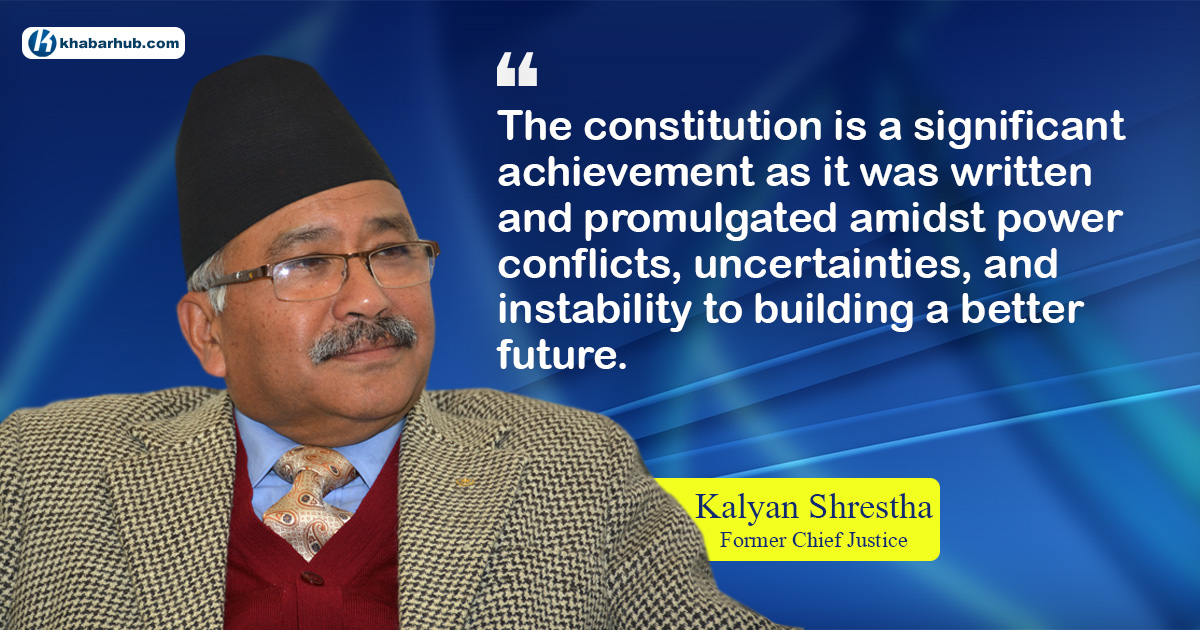The Constituent Assembly, a body of people’s representatives, promulgated Nepal’s constitution. In principle, the constitution, written by people’s representatives, should bear the aspirations of the people it is intended to govern.
It is, in fact, a significant achievement of the people as it was written and promulgated amidst power conflicts, uncertainties, and instability to building a better future by establishing political and socio-economic order based on peace, unity, democracy, social justice, freedom, and development.
The constitution is also called an agreed document. It may, of course, have many loopholes. We better focused on its implementation rather than pointing out at its weak points. This is the need of the hour.
We have written many constitutions in the past and witnessed their applications. Unlike the previous constitutions, this constitution was promulgated by the historic Constituent Assembly.
We held elections and formed the government in line with the constitution. These are the minimum processes of a democratic system. However, it is not the goal in itself.
The concern should be to try to find out whether the government is genuinely paying its attention to this issue rather than suspecting its working style and intentions.
What is the goal then?
There are 31 fundamental rights enshrined in the constitution. These include political, civil, socio-economical, and cultural. It is a blend of both the communist and capitalistic characteristics of the constitution.
Challenges in implementation
The fundamental rights laid down in the constitution are not just to fill out the pages. They must ensure the rights of the citizens. The challenging part lies in its implementation.
The fundamental rights should come into force immediately. It took around three years to draft 17 Acts related to the fundamental rights.
However, hardly the acts have come into operation yet. If the acts do not come into the day to day practice, it will be worthless.
The constitution says that all Nepalis are entitled to the right to employment and health. But it is not clear about the source of budget and the amount to be incurred while executing the provision. Without the budget, these fundamental rights cannot be implemented.
So far as my knowledge is concerned, I have not come across a single voice suggesting invoke of any Act as a remedy to his/her encroached fundamental rights. It shows that it is still non-operative. The question is: when is it going to be operative?
Every fundamental right is worth a million dollars. No study has been made so far as to how much money is required to implement the right to employment.
The constitution says that all Nepalis are entitled to the right to employment and health. But it is not clear about the source of budget and the amount to be incurred while executing the provision. Without the budget, these fundamental rights cannot be implemented.
The concern should be to try to find out whether the government is genuinely paying its attention to this issue rather than suspecting its working style and intentions.
Fundamental rights are vital tools with which people can bargain with the state. They have to understand the importance of these tools to fight against discriminations.
If people are not able to exercise their fundamental rights, other rights will be irrelevant which weakens the base of the principle of the fundamental rights.
The state should be serious and responsible for the people’s fundamental rights.
Who is responsible?
Who will be responsible in case the fundamental rights remained dysfunctional?
In general, the state should be held responsible. Ultimately, the responsibility will go to the political parties who drafted and promulgated the constitution.
If we develop the culture of treating fundamental rights flippantly, the constitutional system will be limited to papers.
Rights are vital remedies to the multi-faceted problems of the people. If fundamental rights are ignored or treated lightly, the constitutional system will be in jeopardy. The constitution should be a true manifestation of the people’s aspirations.
(Shrestha is former Chief Justice)









Comment